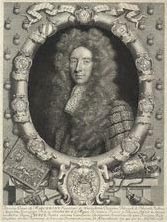
Patrick Hume, 1st Earl of Marchmont
Encyclopedia

Patrick Hume of Polwarth
Sir Patrick Hume of Polwarth and Redbraes was a Scottish courtier and makar , the eldest son of Patrick and Agnes Hume, a major Scottish Borders family with landholdings in The Merse. As eldest son, Patrick Hume succeeded to the family estates, including Redbraes Castle, on the death of his father...
who died in 1609.
Born at Polwarth, Berwickshire
Polwarth, Scottish Borders
Polwarth is a village and parish in the Scottish Borders area of Scotland. It is located at , between Greenlaw and Duns, in the former county of Berwickshire....
, he was raised as a strict Presbyterian, and after a term of law study at Paris
Paris
Paris is the capital and largest city in France, situated on the river Seine, in northern France, at the heart of the Île-de-France region...
he represented his native country in Parliament, where he at once took a foremost place as defender of the Covenanter
Covenanter
The Covenanters were a Scottish Presbyterian movement that played an important part in the history of Scotland, and to a lesser extent in that of England and Ireland, during the 17th century...
s. He went so far as to bring imprisonment upon himself, and on being freed was suspected of complication in the Rye House Plot
Rye House Plot
The Rye House Plot of 1683 was a plan to assassinate King Charles II of England and his brother James, Duke of York. Historians vary in their assessment of the degree to which details of the conspiracy were finalized....
, so that he was forced to remain in hiding until he could escape in disguise to the Continent
Europe
Europe is, by convention, one of the world's seven continents. Comprising the westernmost peninsula of Eurasia, Europe is generally 'divided' from Asia to its east by the watershed divides of the Ural and Caucasus Mountains, the Ural River, the Caspian and Black Seas, and the waterways connecting...
. There he joined the Archibald Campbell, 9th Earl of Argyll
Archibald Campbell, 9th Earl of Argyll
Archibald Campbell, 9th Earl of Argyll was a Scottish peer.He was born in 1629 in Dalkeith, Scotland, the son of Archibald Campbell, 1st Marquess of Argyll....
and embarked with him on the unsuccessful 1685 expedition to Scotland. Hume became a refugee
Refugee
A refugee is a person who outside her country of origin or habitual residence because she has suffered persecution on account of race, religion, nationality, political opinion, or because she is a member of a persecuted 'social group'. Such a person may be referred to as an 'asylum seeker' until...
with a price set upon his head; but he once more escaped abroad and lived at Utrecht
Utrecht (city)
Utrecht city and municipality is the capital and most populous city of the Dutch province of Utrecht. It is located in the eastern corner of the Randstad conurbation, and is the fourth largest city of the Netherlands with a population of 312,634 on 1 Jan 2011.Utrecht's ancient city centre features...
under the name "Dr. Wallace," professing to be a Scottish surgeon. He returned with William of Orange
William III of England
William III & II was a sovereign Prince of Orange of the House of Orange-Nassau by birth. From 1672 he governed as Stadtholder William III of Orange over Holland, Zeeland, Utrecht, Guelders, and Overijssel of the Dutch Republic. From 1689 he reigned as William III over England and Ireland...
at the Revolution of 1688
Glorious Revolution
The Glorious Revolution, also called the Revolution of 1688, is the overthrow of King James II of England by a union of English Parliamentarians with the Dutch stadtholder William III of Orange-Nassau...
.
With estates restored, he was now a Scottish peer, Lord Polwarth; was made Lord Chancellor in 1696 and Earl of Marchmont
Lord Polwarth
Lord Polwarth, of Polwarth in the County of Berwick, is a title in the Peerage of Scotland. It was created in 1690 for Sir Patrick Hume of Polwarth, 2nd Baronet, Lord Chancellor of Scotland from 1696 to 1702...
in 1697. He strenuously opposed in Parliament the claims of the Old Pretender
James Francis Edward Stuart
James Francis Edward, Prince of Wales was the son of the deposed James II of England...
to the crown and voted for the union of Scotland with England, though he was not above the suspicion of having received a reward for so doing. Too dogma
Dogma
Dogma is the established belief or doctrine held by a religion, or a particular group or organization. It is authoritative and not to be disputed, doubted, or diverged from, by the practitioners or believers...
tic to be popular, he did not hold office in the United Kingdom
United Kingdom
The United Kingdom of Great Britain and Northern IrelandIn the United Kingdom and Dependencies, other languages have been officially recognised as legitimate autochthonous languages under the European Charter for Regional or Minority Languages...
till the reign of George I
George I of Great Britain
George I was King of Great Britain and Ireland from 1 August 1714 until his death, and ruler of the Duchy and Electorate of Brunswick-Lüneburg in the Holy Roman Empire from 1698....
, when he was given some minor charges, but shortly retired.

